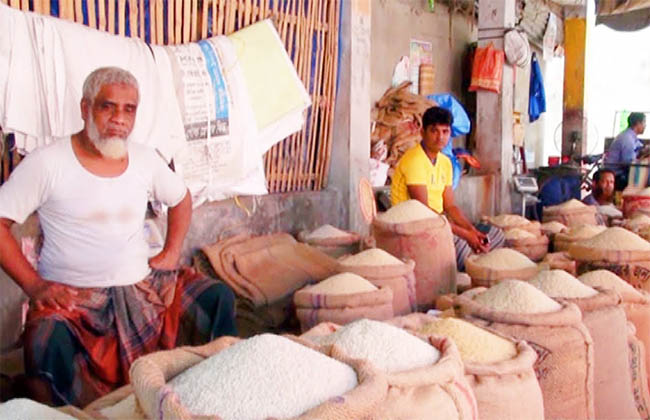
Rice is the main product of the food basket of the people of Bangladesh. Inflation in the product’s price has been on the rise for a long time. According to the Bangladesh Bank, the point-to-point inflation in rice price in March last year was 3.4 per cent. At the end of December that year, the rate stood at 19.4 per cent. This uptrend is still going on. At present, the rise in food prices, including rice, is contributing to increasing the country’s overall inflation. As a result of inflation in rice, the low-income people and the poor will be more vulnerable to financial pressure. Therefore, effective government intervention is needed to control the market.
The price of the product has been steadily rising throughout the pandemic period. According to a market analysis, the price of rice has gone up by Tk3-5 per kg from December last year to March this year. There are several reasons behind this rise. Cyclone Amphan and two flash-floods last year disrupted agricultural production while the government reserves also reduced at the same time. Traders have destabilised the market by taking advantage of a low production, reduced government reserves and state procurement failures, causing inflation to go up. One of the proven ways to control food inflation is to take action based on accurate information. Developed countries as well as our neighbouring countries, including India, also control inflation through accurate information. In particular, India analyses, in detail, the amount of food production, government reserves, and reserves at the private level. It uses an app to collect this information from different levels of farmers, starting from the field level.
Sadly, informational discrepancies exist in our country. There is no accurate calculation of the amount of rice in the country. The gap between government accounts and that of the private sector is huge, sending out a wrong message to the government about the food situation in reality.
Already, the pandemic has had a negative impact on people’s income. During the ongoing lockdown, the means of income of workers is also closed. In this situation, rising inflation is further reducing the real income of the low-income and poor people. Its long-term effects are even greater. Now, the stock and supply situation of rice needs to be improved rapidly through import and internal procurement. The government’s routine procurement of the food product must not fail. The commerce ministry has to take effective measures to eliminate inconsistencies in the supply system. In the country, an artificial crisis is often created in the market by a syndicate of middlemen and dishonest traders, resulting to a rise in rice prices.
Therefore, it is necessary to keep a close eye on the manipulation by the syndicate. Regular operations should be conducted in the market. Rice inflation should be brought under control through multidimensional state measures.

